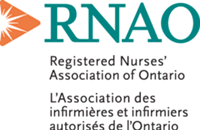Nurses warn the Ontario government will bear responsibility for preventable deaths that will ensue from withdrawing essential life-saving health services
TORONTO, Nov. 18, 2024 /CNW/ - Legislation introduced by Premier Doug Ford's government is a sweeping attack on harm reduction and supervised consumption services (SCS) across Ontario, effectively blocking municipalities from addressing the toxic drug crisis, warns the Registered Nurses' Association of Ontario (RNAO). The move will lead to unsafe communities, increased deaths, overwhelmed emergency services, and escalating health-care costs. Nurses say the Ontario government will bear responsibility for the avoidable loss of life.
On Monday, the government tabled a bill to close SCS sites located within 200 metres of a school or child care centre by March 31, 2025. This directive affects nine provincially funded sites in Ottawa, Guelph, Hamilton, Thunder Bay, Kitchener, and Toronto, as well as one privately funded site in Toronto. Since 2017, these 10 sites have prevented approximately 8,500 overdose-related deaths. By choosing to close rather than relocate these services, the government is knowingly increasing the risk of preventable deaths and health-care costs, as highlighted by its own internal assessments.
The legislation further restricts municipalities from renewing applications to the federal government for SCS sites, effectively eliminating harm reduction services in Ontario. This comes amid a devastating crisis that claimed 3,800 lives last year and over 22,000 since 2018, when Premier Ford's government first took office. The bill also prohibits municipal advocacy for decriminalizing personal drug use, disregarding evidence-based harm reduction strategies and undermining democratic processes.
The scope of the crisis is dire, with an average of 10 people dying daily from tainted drugs. "We will witness more preventable deaths because the government is sending a clear message: people who use substances are disposable," says RNAO President and NP Lhamo Dolkar. "Supervised consumption services sites save lives by providing critical mental health and health-care support. You cannot help someone after they are dead," she emphasizes.
Dr. Doris Grinspun, RNAO's CEO, criticizes the government's focus on crime reporting near remaining SCS sites while ignoring evidence provided by the police that shows there is less crime in communities with SCS than in those without these health and social services. The Premier and his team are also aware of the proven benefits of SCS services in reducing deaths, illness, and health-care costs. "This is an ideologically driven policy that will cost more lives. Our health system treats those with cancer and chronic illnesses with compassion and with comprehensive services; we must extend the same care to persons dealing with substance use," Grinspun urges. She warns of increased deaths, more discarded needles, and rising infections such as HIV and Hepatitis C. "The result will be more parents burying their children and longer wait times for ambulances. Just one HIV case can cost taxpayers half a million dollars. Premier Ford, our communities need more health care, not more ideology."
While RNAO acknowledges the government's August announcement of $378 million for 19 new Homelessness and Addiction Recovery Treatment (HART) Hubs, it criticizes the exclusion of harm reduction services like SCS, safer supply programs, and needle exchanges. "HART Hubs should offer comprehensive, wrap-around care, but this plan falls short and contradicts the stated aim of keeping communities safe," says Grinspun.
Dolkar points to a lack of genuine engagement with local communities: "Mayors across Ontario have called for more support for mental health, substance use, and homelessness. Despite promises to listen, this legislation silences their voices and undermines their ability to advocate for public health." The legislation also bans municipalities from seeking exemptions to operate SCS sites, pushing more people towards emergency rooms or worse, dying on the streets. Data indicates that closing these sites will increase substance use and the presence of discarded needles, contrary to the government's assertions.
"By cutting these services, Premier Ford is creating barriers to health care for those who need it most," says Dolkar. The government's own documents highlight the disproportionate impact on Indigenous, Black, and low-income individuals who already face significant barriers. "Harm reduction programs help build trust with care providers, opening pathways to primary care and support. This legislation will only make it harder for vulnerable groups to access essential services," Dolkar adds.
When elected to office, Premier Ford committed to 21 SCS sites. Seventeen were delivered and then the government stopped assessing applications for additional sites forcing Windsor, Sudbury, and Timmins to close, and Barrie to withdraw their application. With 10 sites now being closed, only eight will remain. Monday's decision is a nail in the coffin for SCS and the Ontarians they serve. "RNAO calls on Premier Ford and his government to immediately reverse its decision to close SCS sites and instead adopt an integrated care model that supports both harm reduction and treatment services. The government can still change course, but once these closures lead to the first death, it will be too late," Dolkar concludes.
The Registered Nurses' Association of Ontario (RNAO) is the professional association representing registered nurses, nurse practitioners and nursing students in Ontario. Since 1925, RNAO has advocated for healthy public policy, promoted excellence in nursing practice, increased nurses' contribution to shaping the health system, and influenced decisions that affect nurses and the public we serve. For more information about RNAO, visit RNAO.ca or follow us on X (formerly Twitter), Facebook, Instagram and LinkedIn.
SOURCE Registered Nurses' Association of Ontario

For more information, please contact: Madison Scaini, Communications Officer/Writer Registered Nurses' Association of Ontario (RNAO) 1-800-268-7199 ext. 274 416-408-5645 [email protected]; Marion Zych, Director of Communications, Registered Nurses' Association of Ontario (RNAO), 1-800-268-7199 ext. 209, 416-408-5605, 647-406-5605 (cell), [email protected]

Share this article